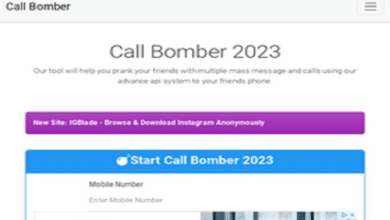The Massage Bomber: What It Is, Its Risks, and How to Protect Yourself

In today’s fast-paced world, people often seek ways to relax and relieve stress, and massages have become a popular method for unwinding. However, the rise of new digital threats means that even something as benign as a massage can have darker connotations. One such threat is the concept of a “massage bomber.” This term refers to a potentially harmful phenomenon involving digital or physical manipulation with deceptive intent, which can lead to harm if not handled properly. In this blog, we will explore what a massage bomber is, how it works, the risks involved, and what steps you can take to protect yourself from falling victim to this alarming trend.
What is a Massage Bomber?
A “massage bomber” may sound like an innocuous term, but it can refer to several different things, depending on context. Typically, the term is used in the context of online scams, digital manipulations, or deceptive practices that are linked to health or wellness, particularly massages. The term “bomber” refers to an overwhelming or sudden occurrence, while “massage” ties into relaxation or wellness-related themes.
- Deceptive Marketing Practices:
Some businesses use the term “massage bomber” to describe aggressive or misleading marketing tactics to sell massage services or products. These could involve bombarding potential customers with countless emails, SMS messages, or advertisements promoting services that are not as advertised. - Digital Scams:
In a more technical context, a massage bomber could also refer to malicious software or bots that are used to flood a person’s phone or email with deceptive messages, often leading to scams or fraud. This could include fake advertisements for massage deals that prompt the recipient to click on harmful links or share personal details. - Physical Tactics:
Another interpretation is linked to the physical realm of wellness, where some businesses or individuals use overly aggressive marketing to sell massage sessions. This could involve pressure tactics or using high volumes of calls or messages to push customers into buying services.
How Does a Massage Bomber Work?
Understanding how a massage bomber works is key to recognizing and defending against it. Whether it’s a scam, a marketing tactic, or malicious software, the common denominator is an overwhelming, unsolicited approach that causes disruption. Here are a few examples of how a massage bomber might operate:
- Flooding with Messages:
A massage bomber can flood a person’s phone or email with messages promising discounted or free massage services. These messages often contain suspicious links or prompts that ask for sensitive personal information. Over time, the sheer volume of messages can become overwhelming, making it difficult for the recipient to differentiate between legitimate offers and scams. - Fake Offers:
Massage bombers often operate by sending enticing offers that seem too good to be true, such as a “free massage” or “exclusive deal” that leads to hidden fees or other fraudulent activities. When the individual clicks on the offer, they may be led to a malicious website that steals their credit card information or infects their device with malware. - Malware and Phishing Attacks:
A more tech-savvy massage bomber might distribute malicious software in the form of a phishing attack, where the victim is tricked into providing sensitive data, like passwords or banking details. These attacks often appear as massage-related promotions, leading the user to click on a compromised link or download harmful files.
Risks Associated with Massage Bombers
While the term “massage bomber” may seem harmless, the risks associated with this type of activity are significant and should not be underestimated. Whether you’re dealing with deceptive marketing, a digital scam, or a more malicious attack, the following risks should be kept in mind:
- Identity Theft:
If you fall victim to a massage bomber scam, your personal information, such as your name, address, and credit card details, may be stolen and misused. This can lead to identity theft and financial loss. - Emotional and Psychological Distress:
Constantly receiving unwanted messages or offers can lead to stress and anxiety, particularly if the bombardment disrupts your day-to-day activities. This is especially true when dealing with aggressive marketing or fake offers that create a sense of urgency or fear. - Device Infection:
Clicking on fraudulent links or downloading attachments from suspicious messages can expose your devices to malware. Once your device is infected, the attacker can gain access to your personal data, monitor your online activities, or even hijack your devices for malicious purposes. - Financial Loss:
Many massage bomber schemes are designed to trick individuals into providing their financial details, either by pretending to offer a service that requires payment or by encouraging users to download fake apps that require payment upfront. - Legal Consequences:
In some cases, engaging with a massage bomber could have legal ramifications, especially if the attack involves defrauding others or engaging in unauthorized data collection. Legal investigations may follow in cases where the perpetrators are caught.
How to Identify a Massage Bomber
Being able to recognize the signs of a massage bomber is essential to avoiding its harmful effects. Here are some red flags to watch out for:
- Unsolicited Messages or Calls:
A major indicator of a massage bomber is receiving unsolicited calls, texts, or emails about massage services that you didn’t request. If you notice that the communication feels impersonal or too frequent, it’s a warning sign. - Too Good to Be True Offers:
If you’re offered a massage deal that sounds too good to be true – such as a free massage or an incredibly cheap service – it’s likely a scam. Always approach such offers with caution. - Suspicious Links or Attachments:
Another key sign of a massage bomber is the presence of suspicious links or attachments in the messages you receive. Clicking on these can expose you to malware or phishing attempts. - Urgency or Pressure:
Massage bombers often create a sense of urgency, asking you to act quickly to redeem an offer. They might use phrases like “limited time offer” or “exclusive deal” to rush you into clicking on a link or sharing personal information. - Inconsistent Contact Information:
If the sender uses generic email addresses, untraceable phone numbers, or suspicious websites that don’t look professional, it’s likely part of a scam. Legitimate businesses will always provide clear, verifiable contact details.
How to Protect Yourself from Massage Bombers
While the risks associated with massage bombers are significant, there are several strategies you can use to protect yourself. Here are some practical steps to help you stay safe:
- Block Suspicious Numbers and Emails:
If you start receiving unsolicited messages from a massage bomber, the first step is to block the sender. Most smartphones allow you to block numbers, and email services often have spam filters that can help manage unwanted messages. - Don’t Click on Suspicious Links:
If you receive a message that contains a link, don’t click on it unless you’re sure it’s from a trusted source. Even if the message looks legitimate, it may lead you to a phishing site or infect your device with malware. - Use Antivirus and Anti-Malware Software:
To protect your devices from potential threats, use trusted antivirus and anti-malware software. These programs can help detect and block harmful content before it can cause damage. - Verify Offers Before Sharing Information:
Always double-check any massage offers before sharing personal or financial information. You can contact the business directly to verify whether they’ve sent you a legitimate offer. - Report Scams to Authorities:
If you suspect that you’ve encountered a massage bomber, report the scam to relevant authorities or consumer protection agencies. They may be able to take action to prevent further harm.
The Future of Massage Bombers: What’s Next?
As technology continues to evolve, so too do the tactics employed by massage bombers. The rise of artificial intelligence and automated bots makes it easier for scammers to target individuals at scale. We can expect that massage bombers will become increasingly sophisticated in their approaches, using more personalized tactics and leveraging data to make their scams more convincing.
Governments and businesses are also taking steps to address these growing threats. Enhanced regulations, better consumer education, and improvements in cybersecurity measures will play a significant role in minimizing the impact of massage bombers. However, it’s crucial for individuals to remain vigilant and proactive in protecting themselves from such threats.
Conclusion
A “massage bomber” may sound like a term that belongs in a wellness-related blog, but the reality is far more sinister. Whether it’s a form of digital manipulation, an aggressive marketing tactic, or a full-blown scam, understanding the risks associated with massage bombers is key to safeguarding your personal and financial well-being. By staying vigilant, recognizing the signs of a scam, and taking appropriate steps to protect yourself, you can minimize the potential harm caused by these deceptive tactics.
FAQs
- What exactly is a massage bomber?
A massage bomber refers to a deceptive tactic or scam involving an overwhelming amount of unsolicited messages, typically related to massage offers, designed to trick or manipulate individuals. - How do massage bombers work?
Massage bombers flood individuals with unsolicited messages or calls, often promising fake massage deals that lead to scams or phishing attacks. - Is it safe to click on links from massage bombers?
No, clicking on links from massage bombers can lead to malware infections or phishing attempts. Always avoid clicking on suspicious links. - How can I protect myself from massage bombers?
Protect yourself by blocking suspicious messages, using antivirus software, and verifying offers before sharing personal information. - Are massage bombers illegal?
Yes, massage bombers are usually associated with fraudulent activity, and their tactics are illegal. Always report scams to the appropriate authorities.





